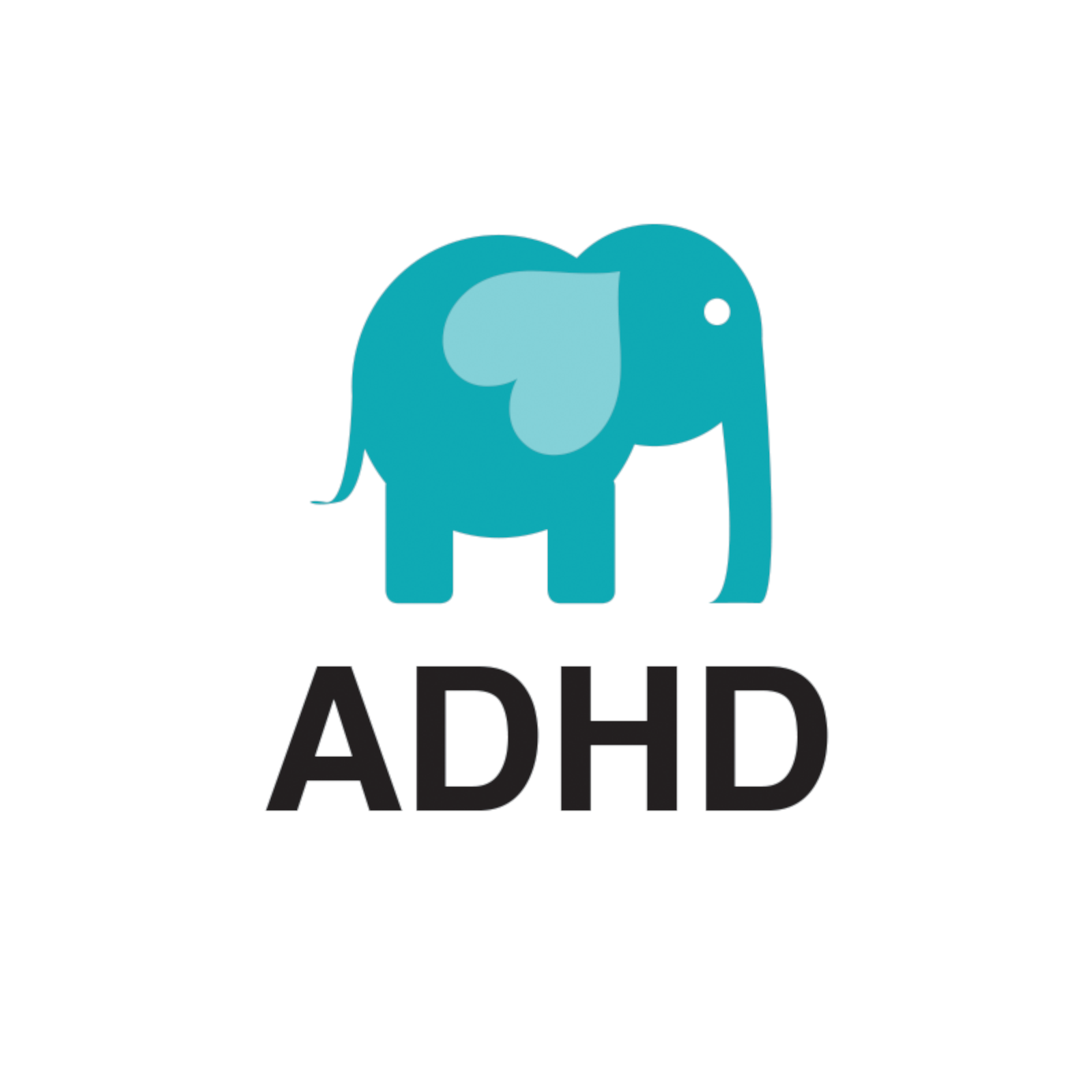
809.2K
Downloads
213
Episodes
Drawing on years of experience working with families, Parenting Coaches Siope Kinikini and Kimber Petersen share how families can improve, heal, and find success using the proven methods of the Teaching-Family Model. Visit smarterparenting.com to learn more.
Episodes
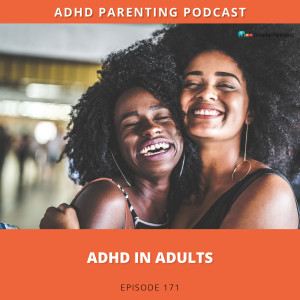
Wednesday Jan 19, 2022
Ep #171: ADHD in adults
Wednesday Jan 19, 2022
Wednesday Jan 19, 2022
Are you an adult who has ADHD or think you may have ADHD? This podcast is for you as ADHD Parenting Coach Siope Kinikini discusses ADHD in adults and tips for managing it.
When they receive an ADHD diagnosis for their child, many parents may recognize having similar symptoms or challenges, especially when they were younger, and believe they have ADHD.
Recognizing that you may have ADHD can allow you to understand the challenges your child may face.
If you suspect you have adult ADHD, you can get diagnosed by your health care provider. ADHD in adults looks different from ADHD in a child, and often, adults with ADHD have learned to live with/manage their symptoms.
To be diagnosed with ADHD as an adult, the symptoms must be severe enough to cause issues in everyday life.
There are multiple options for adults to manage their ADHD, including medication, various therapy, and coaching. One resource we recommend for adults is the book Fast Minds: How to thrive if you have ADHD (or think you might).
The more you can manage your ADHD symptoms, the better help you will be to your child in managing theirs. This is why we love the skill of Role-play. Because those with ADHD can be easily distracted or inattentive, telling them what they should do isn't as effective as showing them how to do it and then practicing.
By practicing, you are engaging all the senses, allowing your child to be more effective and successful doing it on their own. You can find the free video tutorial on Role-playing at SmarterParenting.com.
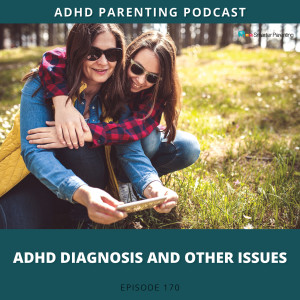
Wednesday Jan 12, 2022
Ep #170: ADHD diagnosis and other issues
Wednesday Jan 12, 2022
Wednesday Jan 12, 2022
Today's podcast goes over how an ADHD diagnosis is reached. What other issues may also be present, and how parents can use skills to create connections with their children.
A diagnosis does not cover all the symptoms and will not look the same for every child. Some children may present more of one symptom and not others. Getting an official diagnosis allows parents to adapt better to serve their child's needs.
Often children with ADHD may also present additional symptoms that aren't ADHD, such as anxiety or depression. The order of treatment will depend on what symptoms are most severe.
Often, children with ADHD may feel judged or different, so it's important to foster connections, especially when acting out. The skills on Smarter Parenting are all about helping parents find ways to connect with their children.
We know that connecting with our children, especially when they are angry, tired, or acting out, can be challenging, so we love the skills so much. The skills give you the steps needed to create connections while being calm and present and not making things worse.
You can create an excellent and healthy relationship with your child that will benefit them their whole life!
Learn more about the skills today! You can find the free skills at SmarterParenting.com
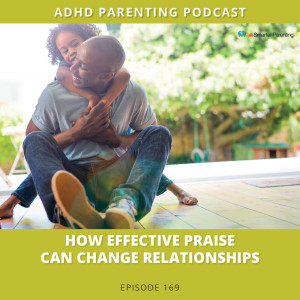
Wednesday Jan 05, 2022
Ep #169: How Effective Praise can change relationships
Wednesday Jan 05, 2022
Wednesday Jan 05, 2022
If you want a better relationship with your child, learn how to give Effective Praise.
Effective Praise isn't complicated, but it will change how you see your child and how your child sees you.
Effective Praise helps you see--and recognize--what your child is doing well. Noticing what our child is doing well can be challenging for most parents, especially in the everyday hustle and bustle.
Because we have so much on our plates as parents, it's easy to focus on what our child needs to do differently so that life is more manageable, whether that's doing their chores or not talking back, or a million other things.
Most parents fail to understand that the most significant change comes when focusing on the positives and not the negative. When we focus on positives, our child feels noticed and understood, which means they are more likely to repeat that behavior.
Parents who use Effective Praise consistently have found the relationships with their child improving--even relationships that were difficult previously.
You can change your relationships with your child, and Effective Praise is how you do it.
The steps to Effective Praise are:
Show your approval or find a positive.
Describe the positive behavior. Be specific.
Give a meaningful reason to repeat the behavior.
Give a reward (option)
You can learn more about Effective Praise at SmarterParenting.com
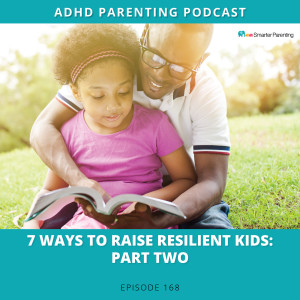
Wednesday Dec 29, 2021
Ep #168: 7 ways to raise resilient children: Part 2
Wednesday Dec 29, 2021
Wednesday Dec 29, 2021
Successful adults are those who have learned how to be resilient. If you want your child to be successful in the future, you need to teach them how to be resilient.
Being resilient means helping them approach new situations and setbacks in positive, not negative, ways.
Some things that resilient children do:
- Communicate effectively. By expressing how they feel without anger or frustration and listening to others' viewpoints, they can find solutions that help them feel heard and valued.
- Make healthy decisions. They can see the pros and cons of decisions, allowing them to make the best overall decision. So often, children have a hard time seeing all sides of a problem or a situation which often leads them to make poor choices or be swayed by outside influences.
- Take responsibility for their actions. No child wants to get in trouble, but those who can own up to mistakes and consequences of actions have an advantage as they grow and mature.
The free skills on SmarterParenting.com help parents teach these vital traits to their children.
If you haven't checked out part 1 of this series, we recommend going back and listening to episode 167.
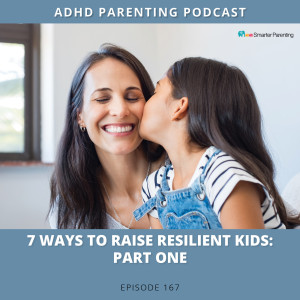
Wednesday Dec 22, 2021
Ep #167: 7 ways to raise resilient children: Part 1
Wednesday Dec 22, 2021
Wednesday Dec 22, 2021
Raising resilient children is something that parents hope to teach their children. Today's podcast discusses three things parents can do to prepare their children to deal with problems, conflicts, and growth successfully. Today's episode is part one, and next week's podcast will finish up the discussion.
To raise successful children, they need tools that help them make sense of and understand the world around them. They need tools for making choices and decisions. They need tools for communication. They need tools that help them understand the long-term consequences or rewards of actions. They need tools to help them understand and describe what they are feeling.
The skills on SmarterParenting.com can do just that. They teach parents precisely what to do to set their children up for success.
When we give our children tools, it makes raising them easier. When they know how to deal with problems, conflicts, and emotions healthy, they are less likely to act out negatively or seek unhealthy attention.
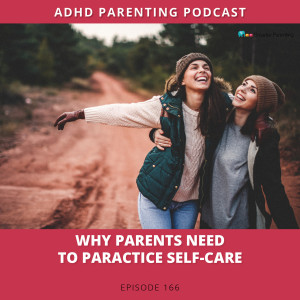
Wednesday Dec 15, 2021
Ep #166: Why parents need to practice self-care
Wednesday Dec 15, 2021
Wednesday Dec 15, 2021
As parents, we can be terrible about practicing self-care. Practicing self-care is vital in helping us be our best.
When we don't practice self-care, we give less than our best to our family. Self-care allows us to recharge and refocus, enabling us to tackle everything we are required to do better.
It can feel like we have no time for self-care or that practicing self-care is selfish. It is not. It is so important!
Yes, practicing self-care may require sacrifices and simplification. Still, the benefits for you and your family will be well worth it as it sends a message to your child that they need to establish healthy boundaries and know their limits.
You wouldn't want your child continually running on empty. You shouldn't either.
When added stresses are added to already busy schedules during the holidays, it can be even more challenging to find the time for self-care. Instead of forgoing self-care, put it on the calendar! Use the SODAS Method to help you determine activities and times that will work for your schedule. Activities for self-care could include a walk, eating a treat, checking social media, talking to a friend, watching a TV show, reading, yoga, journaling, etc. The possibilities are endless. Just find something that works for you and gives you the recharge you need.
Putting it in the calendar does a couple of things. First, it makes it easier to take the time to recharge. Second, it shows everybody the importance of time for yourself. Sometimes it can be easy for our kids to think of us as the energizer bunny with unlimited ability to give and give. Which we all know isn't true.
We hope you'll make self-care an important part of your parenting routine!
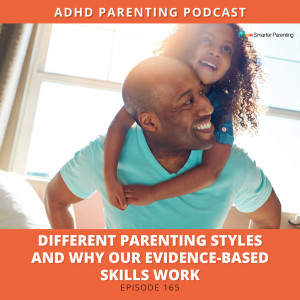
Wednesday Dec 08, 2021
Ep #165: Parenting styles and why our evidence-based skills work
Wednesday Dec 08, 2021
Wednesday Dec 08, 2021
Do you want to be the best parent you can be? Smarter Parenting is here to help you!
Our goal is to help strengthen and improve relationships while giving our children the tools to navigate their lives successfully.
The skills on Smarter Parenting have been used for over 50 years by agencies worldwide to help families succeed. The skills work with children of all ages and abilities. They will work with your child too!
There is a lot of parenting styles and advice out there. Some of it good. Some of it not so helpful.
On extreme ends of the spectrum, two common parenting styles are authoritative parenting and permissive parenting. These parenting styles can teach our children unwanted lessons and long-term behavior.
Science has proven that a parenting style somewhere in the middle is the most effective.
The most significant difference between Smarter Parenting and other parenting styles is our focus on teaching. While we would love our children to know how to behave or listen to us or make the right decisions, those things do not always come naturally. We have to show them how to do it.
The skills Smarter Parenting teaches shows parents how to be both firm and kind while teaching our children what is expected of them.
Children need boundaries as boundaries make them feel safe and a sense of the world. They also need compassion and understanding as they learn how to deal with new emotions and situations.
The best way parents can learn to be better is through skills that balance firmness and kindness. The skills found on Smarter Parenting teach parents how to do just that. The skills are universal and give parents the confidence to handle any parenting situation with compassion, understanding, and fairness.
The skills we teach at SmarterParenting.com are:
- THE ABC'S OF BEHAVIOR: Helping parents understand why behavior happens and what they can do about it.
- OBSERVE AND DESCRIBE: Helping parents remove emotions from situations, and a child knows exactly what they are doing.
- ROLE-PLAYING: This helps a child understands how to react in situations by teaching how they should behave.
- EFFECTIVE COMMUNICATION: Helping families communicate so that everyone feels appreciated and valued.
- EFFECTIVE PRAISE: Helping a child feel valued and seen.
- PREVENTIVE TEACHING: Preparing a child for future situations that may be difficult or tricky for them to navigate.
- FOLLOWING INSTRUCTIONS: Getting a child to listen, do and take responsibility.
- CORRECTING BEHAVIORS: Correcting a child when they've done something wrong in a way that strengthens, not damages relationships.
- DECISION MAKING (SODAS METHOD): Teaching a child to make better decisions by seeing the pros and cons.
- EFFECTIVE NEGATIVE CONSEQUENCES: Reducing negative behavior by encouraging a child to learn instead of punishing them.
- EFFECTIVE POSITIVE REWARDS: Encouraging repeat positive behavior by acknowledging what they are doing well.
The skills we teach on Smarter Parenting are all free. Check them out today!
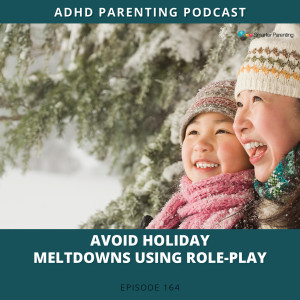
Wednesday Dec 01, 2021
Ep #164: Avoid holiday meltdowns using Role-play
Wednesday Dec 01, 2021
Wednesday Dec 01, 2021
Many children struggle with managing expectations and emotions during the holidays. The behavior skill of Role-play teaches children what is expected in various situations--from holiday shopping to parties. Knowing how they can appropriately respond when they are overwhelmed or excited can go a long way in reducing the meltdowns or craziness they may feel.
The holidays can be a truly magical time for children. That magic, though, can bring new stress or unmet expectations that can be challenging for a child to manage if they haven't been taught what to do instead. For example, if you don't want your child to touch every toy they see at the store, they will need to know what to do instead. They may need to keep their hands on the cart or stop quietly in front of one toy to get a better look as long as they don't pick it up or touch it, but they won't know what to do if you don't practice it with them before you go to the store.
Role-playing allows a parent to address any concerns before they arise. Addressing potential issues while your child is calm and receptive gives them the tools needed to display the appropriate behavior in that specific situation.
Once a child is overwhelmed or too excited, it can be hard to bring them to a calm state. Role-playing keeps a child from escalating too much.
Role-playing will reduce your stress and increase your enjoyment of the season.
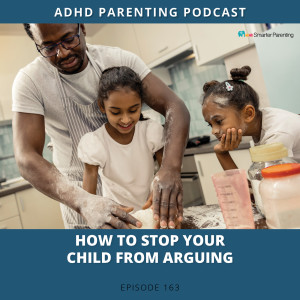
Wednesday Nov 24, 2021
Ep #163: How to stop your child from arguing
Wednesday Nov 24, 2021
Wednesday Nov 24, 2021
Nothing pushes most parents' buttons more than when their child argues when asked to do something.
When a child argues, it can often quickly escalate, pulling in all sorts of wrongs, emotions, and even personal attacks.
When a child is arguing, it is not the time to teach them life lessons or what they should be doing. Instead, your goal should be to deescalate the situation and get your child to a point where they can accept your answer or do what was asked.
The biggest thing is to remember that an argument takes two and that if you, as the parent, don't engage, your child can't argue. The skill of Following Instructions helps parents take a break from the situation by focusing on the original issue and not being drawn into tangents or arguments.
Once a child is calm, you can address the thoughts and feelings brought up during their argument. It's important that our child feels able to express their ideas and feels. We just want to teach them to do it appropriately, and arguing isn't appropriate.
We hope you'll reach out to us on social media for more information about Following Instructions and how to use it to stop arguments.

Wednesday Nov 17, 2021
Ep #162: Using Effective Praise to instill gratitude in our kids
Wednesday Nov 17, 2021
Wednesday Nov 17, 2021
Effective Praise is powerful in teaching our kids gratitude. Effective Praise teaches us to recognize effort and change and then express why that effort means something to us.
Effective Praise is more than just telling someone, "Good job." Rather it's telling them exactly what they did well--no matter how little that progress may be.
For example, your child may struggle cleaning their room. Instead of focusing on what they haven't done or didn't do well, Effective Praise allows us to focus on what they did well, such as, "I can see you took a lot of time to organize your books, and that shows me that those things matter to you and that you want to take care of them."
By acknowledging what they have done, we motivate our children to continue to make progress while reducing the amount of time spent nagging them to do something.
As we show our children that we appreciate what they do well, they will be more likely to apply that same mind frame to friends, teachers, coworkers, and even family members.
You can find the skill of Effective Praise at SmarterParenting.com. We invite you to learn it and start using it in your family, and you will be amazed at how it transforms your outlook and relationships.
